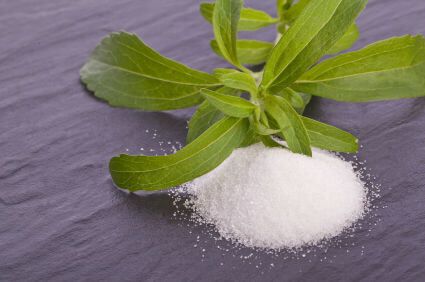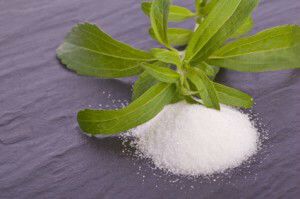
The average American’s sugar intake is truly staggering – nearly 130 pounds per year. Research on the evils of refined sugar, including elevated risks of obesity, type 2 diabetes and depression, have left many of us searching for an alternative.
Processed artificial sweeteners are no safe bet. Aspartame, as well as many of the other chemical compounds used in sugar substitutes, have been linked to cancer in lab animals, plus a host of other health issues.
The stevia plant, which is native to South America, has leaves which are 30-40 times sweeter than sugar, and an extract which is 200 times sweeter than sugar. The remarkable thing about stevia is that it does not raise blood insulin levels.
Whole stevia leaves have been used for hundreds of years in South American countries including Brazil and Paraguay. Stevia in its natural form can be a delicious and natural way to sweeten your meals and beverages.
However, buyer beware: many brands of stevia sold across the country are highly processed, and are not pure stevia at all. The health effects of the FDA-approved, processed stevia extract (rebaudioside A) have not been studied. Furthermore, many stevia brands contain unnecessary and potentially harmful additives.
For example, Truvia, a stevia brand made by Coca-Cola, has approximately 40 steps in its extraction and manufacturing process, which uses chemicals including methanol, acetone, ethanol and isopropanol, several of which are known carcinogens.
Truvia, as well as many other stevia brands, contain erythritol. Erythritol seems natural at first glance, it is a sugar that is sometimes found in fruit, however, in its commercial form it is made from fermented, genetically modified corn.
Commercial stevia products commonly add ‘natural flavors’ to their mixtures. Natural flavors are processed, can be made from virtually anything, and are tailored to be addictive. Dextrose is another common additive, which is nothing more than processed sugar derived from genetically modified corn.
Some brands, even organic brands, use agave inulin, which is fiber from the agave plant, but in a highly processed form. Silica is often used as well, to improve the flow of the powdered stevia.
Besides being added to powdered foods, silica is used to manufacture windowpanes and glassware. It may potentially cause digestive irritation, or respiratory irritation if you happen to breathe it in.
When choosing a stevia product, read the ingredients very carefully, and search for pure ‘whole leaf stevia.’ Even better, why not grow stevia plants in your garden or window box? The leaves can be used fresh, or dried and crumbled in a spice grinder, or by hand.
For another healthy sweetener option, try organic coconut crystals. They are derived from the flowers of the coconut tree, and made from the nectar or sap found in the buds.
Organic coconut crystals, or organic coconut sugar (named this way when ground), has a low glycemic index, contains 12 B-vitamins, a plethora of essential minerals, and 16 out of the 20 amino acids.
 Raw honey is another option, which has many potential health benefits. It has been linked to anti-viral, anti-fungal and antibacterial properties, and contains several B-vitamins, vitamin C, calcium, potassium and magnesium, to name only a few nutrients. However, do not feed raw honey to babies under the age of 1, and steer clear if you have bee allergies.
Raw honey is another option, which has many potential health benefits. It has been linked to anti-viral, anti-fungal and antibacterial properties, and contains several B-vitamins, vitamin C, calcium, potassium and magnesium, to name only a few nutrients. However, do not feed raw honey to babies under the age of 1, and steer clear if you have bee allergies.
Eating honey raw does slightly increase your risk of foodborne illness versus the pasteurized varieties, so make sure yours is sealed well when you purchase it, and store in a cool, dry place in an airtight container. In moderation, raw honey is a great sweetener to a host of culinary concoctions.
With all of the natural, delicious and nutritionally rich options available, there is no reason at all to rely on refined sugar, or processed, chemical-laden substitutes.
-The Alternative Daily
Sources:
http://www.100daysofrealfood.com/2013/04/25/stevia-food-babe-investigates/
http://www.livestrong.com/article/367337-what-are-the-benefits-of-coconut-sugar/
http://www.theorganicprepper.ca/raw-honey-liquid-gold-in-your-pantry-03262013

